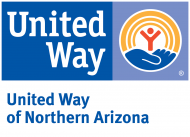United Way of Northern Arizona
Grant Applications
UWNA Community Investment Application Process
United Way of Northern Arizona Announces FY2025 – 2027 Request for Proposals is CLOSED
Community Investment Volunteer ECImpact Access
United Way of Northern Arizona Focus Areas
Youth Opportunity-Step Up for Youth
Early Childhood Development (Ages 0-21)
This initiative will improve social-emotional development, cognitive language skills, early literacy, mathematics, and science learning while increasing support and knowledge for educators, nonprofits, parents and caregivers. This will help ensure that children meet developmental milestones that lead to success throughout their lives.
Impact Areas
- Kindergarten Readiness
- Early Literacy Supports
Youth Opportunity-Step Up for Youth
Positive Youth Development (Ages 0-21)
This initiative is based on the principles of the 6 C’s, which include confidence, character, connection, competence, caring and contribution. This positive framework will guide our community in organizing services, opportunities and support to assist our young people in reaching their full potential.
Impact Areas
- Mental Well-Being and Resilience
- Sense of Belonging and Inclusion
- Youth Leadership Development
- College & Career Readiness
Healthy Community
Safety & Security - Meeting Basic Needs (All Ages)
Being able to meet basic needs like safe housing and adequate food enables families to move from day-to-day existence to planning for a positive future.
Impact Areas
- Safe Shelter
- Temporary Shelter
- Supportive/Transitional/Permanent Housing
- Rent and Mortgage Assistance
- Utility Assistance
- Food Security
- Hot Meals
- Food Boxes
- Pounds of food distributed
- Child Care
- Child Care Centers
- Child Care Tuition Assistance
- Transportation/Resources/Referrals for basic needs
- Mass Transportation Vouchers or transportation-related funding for work/essential appointments (DES, Snap, Job interviews)
- Medication Assistance
- Medication Subsidies for Clients
- General Support for Basic Needs
- Personal care and hygiene
- Clothing
- Infant essentials
Financial Security
Safety & Security - Meeting Basic Needs (All Ages)
Financial security serves as a strong foundation for a fulfilling life, providing numerous benefits extending beyond monetary value. This includes peace of mind, and alleviating stress and anxiety associated with financial uncertainty, freedom, independence and secure financial foundation allwoing individuals to plan for the future
Impact Areas
- Financial Literacy
- Workforce Development
